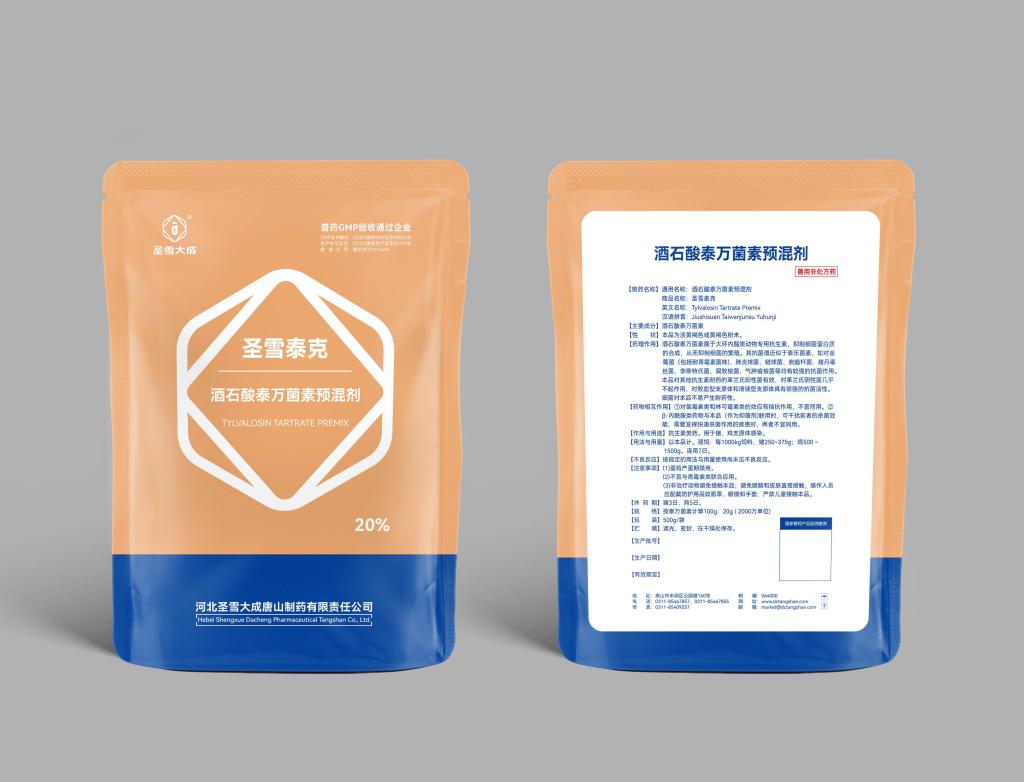Tel:+8618231198596

News
 CONTACT
CONTACT
 CONTACT
CONTACT
- Linkman:Linda Yao
- Tel: +8618231198596
- Email:linda.yao@dcpharma.cn
- Linkman:CHARLES.WANG
- Department:Overseas
- Tel: 0086 0311-85537378 0086 0311-85539701
News
Tylvalosin tartrate premix treats respiratory infections in pigs.
TIME:2024-07-04
Tylvalosin Tartrate: Mode of Action
Tylvalosin tartrate belongs to the macrolide class of antibiotics and exhibits broad-spectrum activity against Gram-positive and Gram-negative bacteria, as well as Mycoplasma species. Its mode of action involves binding to the 50S ribosomal subunit of susceptible bacteria, inhibiting protein synthesis and ultimately leading to bacterial cell death. This mechanism makes Tylvalosin effective against pathogens commonly associated with respiratory infections in pigs, including Actinobacillus pleuropneumoniae, Pasteurella multocida, and Mycoplasma hyopneumoniae.
Efficacy of Tylvalosin Tartrate Premix
Numerous studies have demonstrated the efficacy of Tylvalosin tartrate premix in controlling and treating respiratory infections in pigs:
Actinobacillus pleuropneumoniae (App): Tylvalosin has shown efficacy in reducing lung lesions and clinical signs associated with App infection. It helps in controlling the spread of the bacterium within the herd and mitigating the severity of outbreaks.
Mycoplasma hyopneumoniae: Tylvalosin is effective against Mycoplasma hyopneumoniae, the primary causative agent of enzootic pneumonia in pigs. It reduces coughing, improves lung health, and minimizes economic losses associated with this chronic respiratory disease.
Pasteurella multocida: Tylvalosin exhibits bacteriostatic and bactericidal effects against Pasteurella multocida, which is implicated in respiratory infections and septicemia in pigs. It helps in controlling acute outbreaks and preventing the spread of the pathogen.
Administration and Dosage
Tylvalosin tartrate premix is typically administered orally through feed, making it convenient for large-scale application in pig farms. The premix formulation ensures uniform distribution of the antibiotic in the feed, optimizing therapeutic efficacy. Dosage recommendations may vary depending on the severity of the infection, pig age, and specific pathogen susceptibility profiles. Veterinarians and farm managers carefully calculate and monitor dosage to maximize effectiveness and minimize the development of antimicrobial resistance.
Regulatory Considerations
The use of Tylvalosin tartrate in pigs is subject to regulatory oversight to ensure animal safety, food safety, and environmental protection:
Regulatory Approval: Tylvalosin tartrate premix formulations must undergo rigorous evaluation and approval by regulatory authorities, such as the FDA in the United States and the European Medicines Agency (EMA) in Europe. Approval processes include comprehensive assessments of safety, efficacy, and quality based on data from preclinical studies, clinical trials, and manufacturing standards.
Withdrawal Periods: To prevent antibiotic residues in meat products, regulatory agencies establish withdrawal periods during which treated pigs must not be slaughtered. Compliance with withdrawal periods is crucial to ensure that pork products intended for human consumption meet safety standards.
Antimicrobial Stewardship: Responsible use of Tylvalosin tartrate and other antibiotics is essential to mitigate the development of antimicrobial resistance. Veterinary oversight, adherence to dosage guidelines, and regular surveillance of bacterial susceptibility patterns contribute to effective antimicrobial stewardship practices.
Challenges and Considerations
Despite its efficacy, the use of Tylvalosin tartrate premix in pig farming faces several challenges:
Antimicrobial Resistance: Prolonged and inappropriate use of antibiotics can lead to the emergence of resistant bacterial strains. Continuous monitoring of resistance patterns and implementation of resistance management strategies are critical to preserving the effectiveness of Tylvalosin tartrate.
Cost Considerations: The cost of Tylvalosin tartrate premix and associated treatment protocols can impact its adoption, particularly in small-scale pig farms. Cost-effective strategies, such as optimizing dosage regimens and improving feed efficiency, help mitigate economic barriers.
Regulatory Compliance: Adhering to evolving regulatory requirements and demonstrating compliance with safety and efficacy standards necessitates ongoing investment in research, development, and regulatory affairs.
Future Perspectives
The future of Tylvalosin tartrate premix in pig farming hinges on innovation, sustainability, and collaborative efforts:
Research and Development: Continued research into novel formulations, delivery systems, and combination therapies can enhance the efficacy and safety profile of Tylvalosin tartrate. Innovation in antimicrobial stewardship practices and alternative treatments also plays a crucial role.
Sustainability Initiatives: Embracing sustainable farming practices, reducing antibiotic usage through preventive measures, and promoting animal health and welfare contribute to long-term sustainability in pig production.
Global Collaboration: International cooperation among regulatory agencies, veterinary professionals, and industry stakeholders facilitates harmonization of standards and best practices in antibiotic use and resistance management.
Conclusion
Tylvalosin tartrate premix represents a valuable tool in the management and treatment of respiratory infections in pigs. Its broad-spectrum activity, convenience of administration, and proven efficacy make it a preferred choice for controlling pathogens such as Actinobacillus pleuropneumoniae, Mycoplasma hyopneumoniae, and Pasteurella multocida. Regulatory approval processes ensure its safe and responsible use, while ongoing research and innovation drive advancements in pig health management. By addressing challenges and embracing sustainable practices, the pig farming industry can optimize the use of Tylvalosin tartrate premix, safeguard animal health, and meet global food safety standards.
- Tel:+8618231198596
- Whatsapp:18231198596
- Chat With Skype







